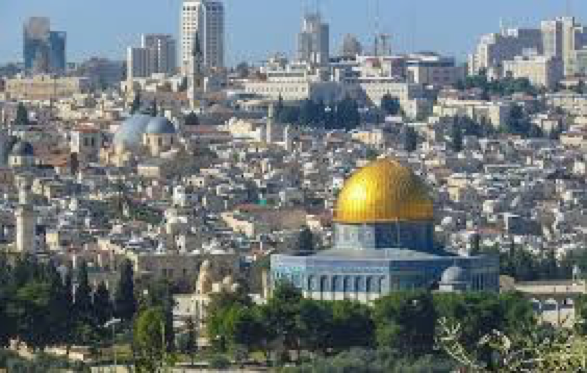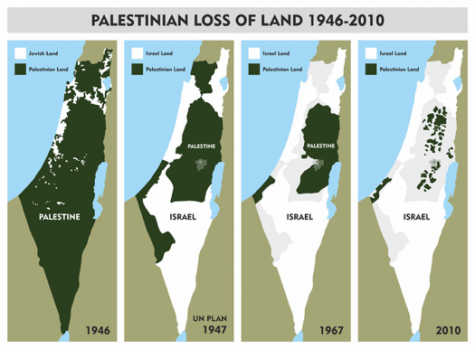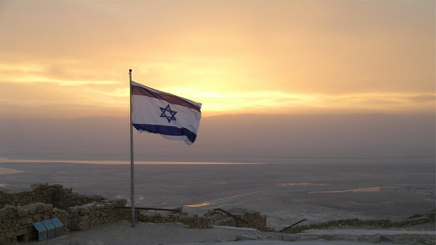The Israeli-Palestinian Conflict

Photo by Creative Commons
The city of Jerusalem, now recognized as the capital of Israel by the United States.
While most reference World War II with the millions of lives that were reaped during the Holocaust, something just as sinister but unbeknownst to the majority arose from this conflict, leading to the eventual creation of the country of Israel in 1948. While this event may have seemed harmless at the time, this action ultimately developed into a violent conflict in which the international community is still feeling the repercussions today.
Zionism, the Jewish national movement, arose in the late-19th century, especially as anti-Semitism (hostility against Jews) became more prominent. After the termination of World War 1, the previous Ottoman Empire crumbled, and the British were granted the right to rule then the country of Palestine. In the Balfour Declaration of 1917, of which the centennial anniversary was recognized just this November, the United Kingdom officially endorsed the establishment of a “national home of the Jewish people.” This initiated a mass immigration of Jews to the Levant area, causing tensions to quickly arise between the immigrants and those already living there. Over the years, Israel garnered increasing might as it got backed by more and more superpowers such as the United States soon after the creation of the state. With monetary as well as military backup, Israel soon expanded to be a superpower of its own in the Middle East. As predicted, this expansion saw violent conflicts with its neighbors including Egypt, Jordan, Iraq, Syria, Lebanon. With each victory, more countries chose to recognize Israel as an official state, and the nation grew to occupy hundreds of square miles. But at price did this expansion lay upon?
According to the Zionist movement, Judaism was not just a religion but a nationality, one that deserved a nation of its own. Jews had been persecuted for centuries, dating back to the ancient civilizations, and felt that unity of the Diaspora communities that had developed all around the world was necessary. With religious incentives, the land of Israel seemed perfect, as it served as the ancient Holy Land and provided the setting for many biblical references. For radical Zionists, the land currently occupied by Palestinians seemed like it had been taken from them, as they had religious history claiming the land. On the other hand, for national Palestinians, who were predominantly Arab and practiced a mix of Islam and Christianity, it was a completely different story. Palestinians had been physically living on the land for generations, dating back to some of the first descendants who had settled on the land. They had experienced the rise and fall of powerful empires and civilizations, persisting through centuries of human history into the modern world. With Palestinian culture deeply rooted into the land, it was only a matter of time before the mass influx of foreigners into their country erupted into a severe issue.

Whose land is it? As this is a point of great contention amongst the international community, one may argue for or against either side. Nevertheless, this disputation is not without its share of bloodshed, having the Israeli-Palestinian conflict escalate to an alarming global crisis in the last few decades. At a rapid pace since the establishment of the nation, Israel has pushed out Palestinians until the only land remaining were small sections of the Gaza Strip and the West Bank, which are still both areas of great contention. With these acquisitions, the past few decades have seen the displacement and exile of millions of Palestinians from their homeland as their residences were revoked. With the explosive settlement of the Jewish population, a tremendous majority of Palestinians have been forced to retreat to refugee camps in neighboring countries including Lebanon, Syria and Jordan. In addition, the Israeli military and government have had brutal crackdowns upon the Palestinian people, with house searches, kidnappings, and killings in the middle of the night. This chaos has led to even more violence, with rocket firings, resistance, terrorist groups and bombings heightening the situation. Israeli-Palestinian borderlands have become a battleground riddled with desolation. Although peace talks have been initiated, they have not been successful, as highlighted by the thousands dead from military operatives.
As it has been the goal of the Palestine Liberation Organization to have international recognition for the State of Palestine, it is unnerving to see that global powers such as the United States, Canada and especially Israel have all refused this. Moreover, just this December, President Trump decided to officially recognize Jerusalem as the capital of Israel and ordered the movement of the U.S. Embassy from the city of Tel Aviv to Jerusalem. Why is this an issue? While West Jerusalem holds the seat of Israel’s government, Palestinians view East Jerusalem as the capital of the future state. With an immense power like the United States formally recognizing the Jerusalem as Israeli territory, this has most definitely disrupted peace talks in the area.

National flag laying claim to the land of Israel
Already, Israel has felt emboldened by this decision, with Israel’s Deputy Defense Minister Eli Ben-Dahan stating, “These Arabs have cheated the world for years…the state of Israel will grow and settlement project will grow.” President Trump has additionally threatened to cut off foreign aid to the Palestinian aid unless they can “bring something to the table.” Around the world, Trump’s decision has drawn a wave of disagreement, with leaders strongly denouncing the action. For instance, the United Nations overwhelmingly voted to make Trump’s decision “null and void” with 128 for to 9 against in the General Assembly as well as every single country in the Security Council except the United States to condemn the decision. Although little action resulted from this due to the United States’s veto power and national sovereignty, the votes elucidate just how many countries negatively view the decision.
As an active global citizen, it is vital to be aware of escalating crises such as these which have shaken the international community. If select countries are unwilling to compromise, especially when faced with immense global condemnation, they pose a great danger to the fragile peace that is essentially ensuring the survival of humanity. With bloodshed on both sides, human rights being infringed upon, and a lack of peace and compromise, the Israeli-Palestinian conflict is one of the world’s most urgent calamities today. While us individuals may not be able to directly participate in the creation of a peaceful two-state solution, we are able to stay aware of global events and help to spread the word.
With all this in mind, what are your thoughts on the issue at hand, and who really has claim to the Holy Land?






